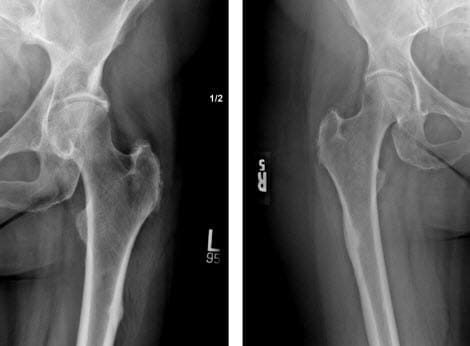With the increase of osteoporosis in older adults, the diagnosis and treatment of abnormal hip fractures, such as bisphosphonate-related proximal femoral fractures, has become more important. According to Dr. Edward J. Fox, MD, obesity is often managed through the long-term use of bisphosphonate treatment, which can inhibit osteoclast-mediated bone regeneration. Over the prolonged utilization of bisphosphonate,
Table of Contents
Understanding Atypical Femur Fractures
Atypical femur fractures are characterized as stress fractures which commonly occur in the proximal one-third of the diaphyseal bone, although they might also occur more distally, developing in the lateral cortex and slowly progressing medially. “With irregular fractures, a small ‘beak’ of bone can form on the lateral surface of the femur and that is where the fracture generally begins,” explains Dr. Fox. This contrasts with stress fractures which occur laterally in the medial portion of the bone.
As a result, when a patient with osteoporosis reports feeling hip and knee pain without previous damage or injury, healthcare professionals will ask about bisphosphonate treatment. It is essential for the doctor to request x-rays of the hip and femur shaft for proper diagnosis. It is also important to request x-rays of the opposite femur, as atypical bisphosphonate-related proximal femoral fractures frequently occur bilaterally. Dr. Edward J. Fox urges patients to discontinue bisphosphonate use in the case of hip fractures, followed by the subsequent use of crutches or a walker. Patients will eventually be able to resume regular physical activities.

Approximately more than 250,000 hip fractures occur in the United States, causing significant patient disability. The variety of hip fractures in older adults, including bisphosphonate-related proximal femoral fractures, often need several treatment approaches which depend on different considerations, such as the mechanism of injury, location and degree of the fracture, as well as the patient’s age and overall health and wellness.
Dr. Alex Jimenez D.C., C.C.S.T.
The precise mechanism of injury by which bisphosphonates cause atypical femur fractures is unknown. Research studies have demonstrated that the suppression of osteoclast activity prevents the clearance of bone fragments which build up on the bone surface during regular daily tasks; decreasing the strength of the bones which lead to fracture. “We all know that the threat of those fractures increases with the extended duration of bisphosphonate exposure, particularly after five decades. Bisphosphonates are stored with a half-life of at least eight decades in
Dr. Edward J. Fox, MD, stated that until research studies find the exact mechanism of injury and treatment for bisphosphonate-related proximal femoral fractures, healthcare professionals should continue to determine the best treatment option for each patient, carefully weighing the benefits and risks of individual patients. The scope of our information is limited to chiropractic as well as to spinal injuries and conditions. To discuss the subject matter, please feel free to ask Dr. Jimenez or contact us at
Curated by Dr. Alex Jimenez

Additional Topics: Acute Back Pain
Back pain is one of the most prevalent causes of disability and missed days at work worldwide. Back pain is the second most common reason for doctor office visits, outnumbered only by upper-respiratory infections. Approximately 80 percent of the population will experience back pain at least once throughout their life. The spine is a complex structure made up of bones, joints, ligaments, and muscles, among other soft tissues. Because of this, injuries and/or aggravated conditions, such as herniated discs, can eventually lead to symptoms of back pain. Sports injuries or automobile accident injuries are often the most frequent cause of back pain, however, sometimes the simplest of movements can have painful results. Fortunately, alternative treatment options, such as chiropractic care, can help ease back pain through the use of spinal adjustments and manual manipulations, ultimately improving pain relief.

EXTRA IMPORTANT TOPIC: Hip Pain Chiropractic Treatment
Post Disclaimer
Professional Scope of Practice *
The information on this blog site is not intended to replace a one-on-one relationship with a qualified healthcare professional or licensed physician and is not medical advice. We encourage you to make healthcare decisions based on your research and partnership with a qualified healthcare professional.
Blog Information & Scope Discussions
Welcome to El Paso's Premier Wellness and Injury Care Clinic & Wellness Blog, where Dr. Alex Jimenez, DC, FNP-C, a board-certified Family Practice Nurse Practitioner (FNP-BC) and Chiropractor (DC), presents insights on how our team is dedicated to holistic healing and personalized care. Our practice aligns with evidence-based treatment protocols inspired by integrative medicine principles, similar to those found on this site and our family practice-based chiromed.com site, focusing on restoring health naturally for patients of all ages.
Our areas of chiropractic practice include Wellness & Nutrition, Chronic Pain, Personal Injury, Auto Accident Care, Work Injuries, Back Injury, Low Back Pain, Neck Pain, Migraine Headaches, Sports Injuries, Severe Sciatica, Scoliosis, Complex Herniated Discs, Fibromyalgia, Chronic Pain, Complex Injuries, Stress Management, Functional Medicine Treatments, and in-scope care protocols.
Our information scope is limited to chiropractic, musculoskeletal, physical medicine, wellness, contributing etiological viscerosomatic disturbances within clinical presentations, associated somato-visceral reflex clinical dynamics, subluxation complexes, sensitive health issues, and functional medicine articles, topics, and discussions.
We provide and present clinical collaboration with specialists from various disciplines. Each specialist is governed by their professional scope of practice and their jurisdiction of licensure. We use functional health & wellness protocols to treat and support care for the injuries or disorders of the musculoskeletal system.
Our videos, posts, topics, subjects, and insights cover clinical matters and issues that relate to and directly or indirectly support our clinical scope of practice.*
Our office has made a reasonable effort to provide supportive citations and has identified relevant research studies that support our posts. We provide copies of supporting research studies available to regulatory boards and the public upon request.
We understand that we cover matters that require an additional explanation of how they may assist in a particular care plan or treatment protocol; therefore, to discuss the subject matter above further, please feel free to ask Dr. Alex Jimenez, DC, APRN, FNP-BC, or contact us at 915-850-0900.
We are here to help you and your family.
Blessings
Dr. Alex Jimenez DC, MSACP, APRN, FNP-BC*, CCST, IFMCP, CFMP, ATN
email: coach@elpasofunctionalmedicine.com
Licensed as a Doctor of Chiropractic (DC) in Texas & New Mexico*
Texas DC License # TX5807
New Mexico DC License # NM-DC2182
Licensed as a Registered Nurse (RN*) in Texas & Multistate
Texas RN License # 1191402
ANCC FNP-BC: Board Certified Nurse Practitioner*
Compact Status: Multi-State License: Authorized to Practice in 40 States*
Graduate with Honors: ICHS: MSN-FNP (Family Nurse Practitioner Program)
Degree Granted. Master's in Family Practice MSN Diploma (Cum Laude)
Dr. Alex Jimenez, DC, APRN, FNP-BC*, CFMP, IFMCP, ATN, CCST
My Digital Business Card


